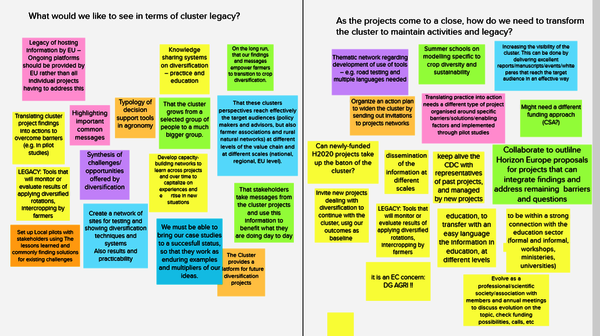This event was timed to coincide with the European Society of Agronomy (ESA) conference in 2020; the last ESA meeting was the venue for our first cluster event. The event was attended by more than 60 people and took place online using a combination of video conferencing platforms.
The morning session was dedicated to meetings of the cross-project working groups (see summaries below). The afternoon session was opened by Antoine Messéan (INRAE, France; DiverIMPACTS coordinator), who welcomed everyone to the session and provided some background to the cluster. The working group leaders provided an overview of the meetings in the morning, focussing on how the working groups' activities could be channelled towards legacy impact and addressing future challenges in crop diversification.
We used a virtual Mural Board to collect and prioritise everyone’s suggestions for how the cluster might be maintained after the projects end and what actions would be needed to transform the cluster to ensure relevance to future opportunities. The meeting ended with updates on joint meetings that are planned in the coming months and a timeline for drafting a cluster legacy plan.
Cluster Working Group on Barriers to Crop Diversification
Members of the DIVERSify, DiverIMPACTS, Diverfarming and TRUE projects met to share information and exchange ideas about project activities carried out to identify the barriers to crop diversification and highlight opportunities to overcome these barriers.
All these projects have carried out stakeholder consultation to identify barriers to uptake, whether for specific cropping practices (e.g., intercropping or legume growing) or more general crop diversification approaches. The consultation activities have ranged from workshops and meetings to online surveys with farmers to gather qualitative and quantitative information, and to stakeholder consultation across the value chain assessing barriers beyond the farm gate. Common themes were identified by the projects including how farmers obtain advice on diversified practices, and where post-farm gate marketing systems are biased towards monoculture cropping.
The working group discussions highlighted where crop diversification practices could provide opportunities to address common challenges in farming and where effort should be focussed in follow on work. A synthesis of the barriers/opportunities work in the cluster project is planned as an output.
Cluster Working Group on Multi-Criteria Analysis and Sustainability Indicators
The third meeting of the working group on Multi-Criteria Analysis and Sustainability Indicators was held on-line, involving scientists from LegValue, ReMIX, DiverIMPACTS and Diverfarming projects.
The meeting objectives were to continue the activities of the Working Group on the basis of the outcomes of the Budapest meeting, held in September 2019 (side event of the European Conference on Crop Diversification) and the bilateral DiverIMPACTS/Diverfarming joint meeting held online in June 2020. The common discussion helped to tune the future activities and to set the work plan for the next steps.
Based on the comparative analysis of the indicators developed by the cluster projects and already carried out in the previous phases of the working group activity, the group decided to proceed in the creation of an integrated database of available indicators that the different projects developed in their actions and to design a toolbox to assist the selection of the sustainability indicators tailored to assess the impact of crop diversification.
The working group is also developing a “crop diversification glossary”, where a wide number of terms related to crop diversification and sustainability assessment are encompassed. Future collaborations with the other working groups of the cluster will be promoted to expand the glossary.
Cluster Working Group on Policy Recommendations
Members of the DIVERSify, DiverIMPACTS, Diverfarming, LegValue, ReMix and TRUE projects met to share the results of policies activities within the different projects as well as to gain insights from the case studies.
The main objective of the working group is to find a way to deliver common messages to the different stakeholders. This can be achieved through the organization of workshops and the delivery of policy briefs. The policy briefs will focus on the project results within the context of the following policies: the UN Sustainable Development Goals, the reform of he Common Agricultural Policy, the UK Agriculture Bill, the European Union's Farm to Fork strategy and Food security.
The working group is important for ensuring consistency in the policy messages developed by each project.
Cluster Working Group on Tools for Crop Diversification
Members of the ReMIX, DiverIMPACTS, Diverfarming, DIVERSify, LegValue and TRUE projects met to continue their work on tools that are being refined or developed to promote uptake of crop diversification. We are currently working together on developing a typology of the tools being developed across the 6 projects. This typology will help us to understand the differentiating features of the different tools – purpose, inputs, outputs, desired outcomes, users, scale etc. It will also help us to understand how the tools that have been developed help us to meet the overall objectives of the Cluster. We are currently discussing definitions of terms with the working group on Multi-Criteria Analysis and Sustainability Indicators to make sure we are using common terminology. The working group members discussed how this information could be made available, for example via the cluster website. A paper describing our typology work will be presented to the AAB/DIVERSify/ReMIX Conference on Intercropping for Sustainability in January 2021.
The working group on communication met a day later; a report from the meeting is now available (link below).

 tap and then scroll down to the Add to Home Screen command.
tap and then scroll down to the Add to Home Screen command.